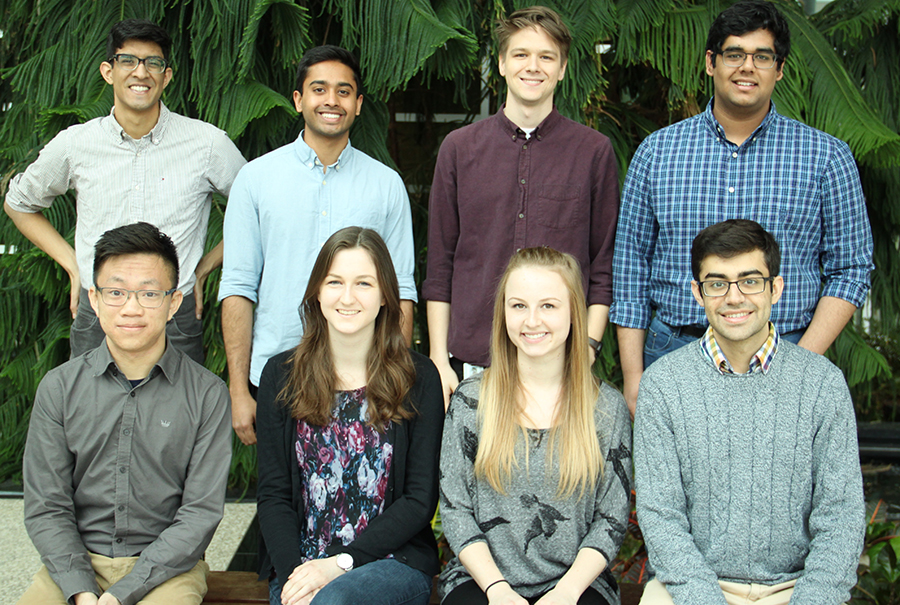Introducing IIDR’s 2017 Summer Student Fellowship Recipients

This year’s IIDR summer student fellowship recipients are jumping for joy!
Every year, the IIDR provides 10 $1000 fellowship awards to eligible undergraduate students and IIDR trainees working throughout the summer. IIDR members recommend potential candidates working under their supervision and recipients are chosen based on the following criteria: contribution to the research field, potential impact, leadership and extracurricular activities and academic achievement.
Learn about the diverse research projects our recipients will be working on throughout the summer and be inspired by their reflections on their achievement:
 Name: Nathan Bullen
Name: Nathan Bullen
Area of Focus: Microbiology Specialization
Supervisor: John Whitney, Biochemistry and Biomedical Sciences
Research: The aim of Nathan’s research is to characterize the mode of action of protein toxin delivery between bacterial cells during interbacterial competition. By characterizing the mechanisms bacteria employ to kill one another, his work has the potential to identify new vulnerabilities to target and thus limit bacterial pathogenesis.
Nurturing career goals: “Receiving this award means I can continue working towards my goal of becoming a research scientist. It is extremely motivating to know that a prestigious institute like the IIDR not only supports my research interests but also my future goals beyond my undergraduate degree.”
 Name: Michael Chong
Name: Michael Chong
Area of Focus: Integrated Science Program – Math and Stats Concentration
Supervisor: David Earn, Mathematics and Statistics
Research: Michael is analyzing 1918 influenza pandemic mortality in Ontario to understand the pandemic and inform decisions on outbreak control.
Putting knowledge to the test: “This award provides valuable support for my summer research project in mathematical epidemiology, and presents me with a unique opportunity to put knowledge and skills to use in a practical setting. I’m excited for the learning experience that lies ahead!”
 Name: Mimi Deng
Name: Mimi Deng
Area of Focus: Biomedical Sciences
Supervisor: Yingfu Li, Biochemistry and Biomedical Sciences
Research: Mimi will collaborate with InnovoGene Biosciences Inc. to validate the propriety platform ANDzyme, a biotechnology that utilizes Functional Nucleic Acids (FNAs) to quickly and accurately detect pathogens in a variety of clinical and environmental settings.
Learning from the best: “Collaborating with innovative and supportive research professionals provides new learning opportunities, which are invaluable to the development of student researchers.”
 Name: Kelly Dong
Name: Kelly Dong
Area of Focus: Biomedical Sciences
Supervisor: Jianping Xu, Biology
Research: Kelly explores adaptive resistance and mitochondrial inheritance under environmental stressors in Cryptococcus neoformans, a fungal pathogen that can cause cryptococcal meningitis in immunocompromised patients.
Broadening her horizons: “This award gives me the opportunity to broaden my horizons by exposing me to great scientists in my area of research, giving me a chance to explore new techniques, and providing avenues for me to discuss my research with others.”
 Name: Suraj Gopinathbirla
Name: Suraj Gopinathbirla
Area of Focus: Biomedical Discovery & Commercialization
Supervisor: Yingfu Li, Biochemistry & Biomedical Sciences
Research: Suraj looks at the development of novel DNAzyme-based biosensor for the detection of Legionella pneumophila. Legionella species are the causative agent of Legionnaire’s disease, a severe form of pneumonia. The biosensor would be highly specific and sensitive, rapid enough for on-site use and responsive to multiple disease-associated serotypes of Legionella.
The pursuit of cutting-edge research: “I have the opportunity to pursue cutting-edge research and the chance to learn something new every day. I have no doubt that this award will provide me with valuable experiences and skills that will aid in my personal development.”
 Name: Nishant Heryani
Name: Nishant Heryani
Area of Focus: Medical Sciences
Supervisor: Charu Kaushic, Pathology
Research: Nishant is investigating the intracellular mechanism of TRIM26, through which DMPA, a progestin-based hormonal contraceptive, increases herpes simplex virus type 2 (HSV-2) infectivity in vaginal epithelial cells. His research is intended to aid in the development of guidelines for contraceptive use in women.
Challenging the status quo: “Being an IIDR trainee is an incredible experience. As a student researcher at IIDR I am constantly encouraged to think critically about the scientific process and challenge the status quo. Moreover, the environment at IIDR is one that fosters personal growth and collaboration. IIDR is truly a place of learning and discovery, and it is a genuine privilege to work here.”
 Name: Arjun Sharma
Name: Arjun Sharma
Area of Focus: Biochemistry, Bioinformatics
Supervisor: Andrew McArthur, Biochemistry and Biomedical Sciences
Research: Combining complex biochemistry and genetics with software engineering practices, Arjun wants to better understand the biology of glycopeptide resistance and software development methodologies to predict glycopeptide resistance and to ultimately help predict antibiotic resistance.
Working on novel projects: “The next few summer months will be spent following up on my 3rd year research project, where I developed a novel algorithm to screen for glycopeptide resistance in silico. During the summer, I’ll be able to more rigorously test my software, in addition to developing another similar algorithm to predict the presence of efflux pump systems from DNA sequence data. I am excited to continue to expand upon my work and see where it takes me!”
 Name: Andrea Tench
Name: Andrea Tench
Area of Focus: Biomedical Sciences
Supervisor: Lesley MacNeil, Biochemistry
Research: Andrea is elucidating how microbiota-derived bacteria influence A? toxicity using transgenic Caenorhabditis elegans models of Alzheimer’s disease. She aims to identify the mechanisms underlying how bacteria previously identified to reduce phenotypes related to A? toxicity confer their effects. The information gained from this project will provide greater insight into the influence of the microbiota in Alzheimer’s pathology and may reveal previously unknown factors that could prove to have therapeutic benefits for Alzheimer’s patients.
Inspiration from IIDR members: “The best part about being an IIDR trainee is the opportunity to learn from and be mentored by intelligent, hard-working, supportive and overall phenomenal scientists who are passionate about their work and wish to pass this passion on to their students.”
 Name: Haley Zubyk
Name: Haley Zubyk
Area of Focus: Biomedical Discovery and Commercialization
Supervisor: Gerry Wright, Biochemistry & Biomedical Sciences
Research: Haley is using high throughput screening to identify an inhibitor of the tetracycline efflux pump, TetA. This includes developing appropriate constructs and designing a cell-based assay that will be used to screen against a natural product library of over 10,000 compounds. Once potential inhibitors are identified through data analysis, supplementary tests will be conducted to verify their activity against TetA.
First-hand experience: “I’m thankful for winning the IIDR Summer Fellowship award and being recognized for my achievements in the lab. Being an IIDR trainee gives me first-hand experience working on the cutting-edge research performed at McMaster University.”
Related News
News Listing

McMaster Health Sciences ➚
Overcoming resistance: McMaster researchers find new utility for old antibiotics
News
January 6, 2025

December 19, 2024


